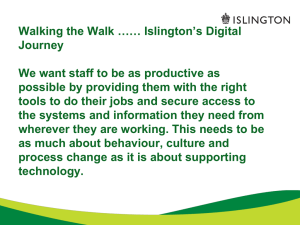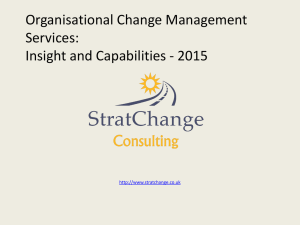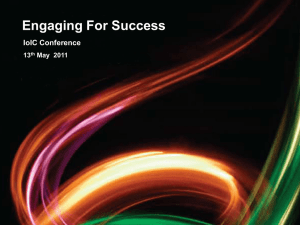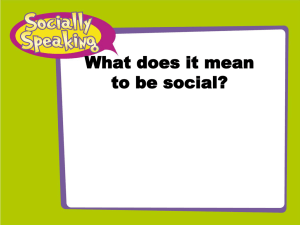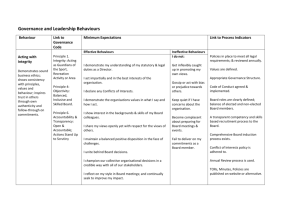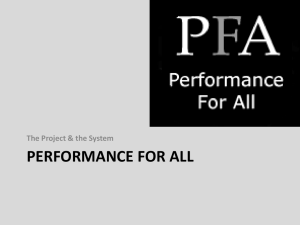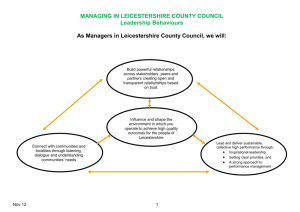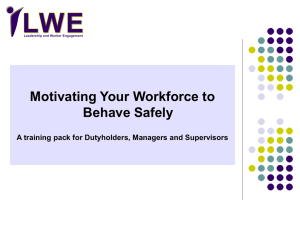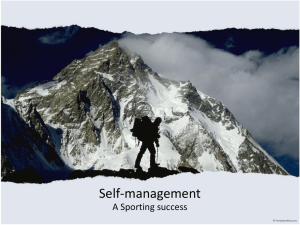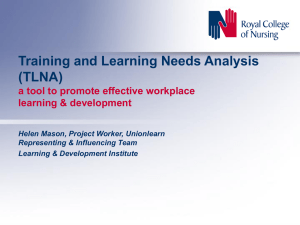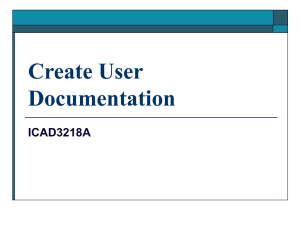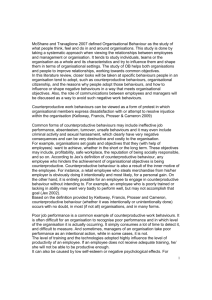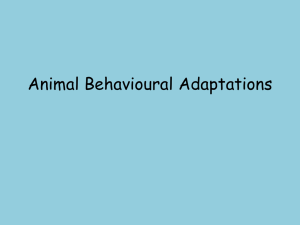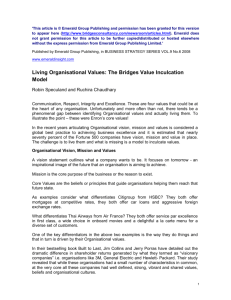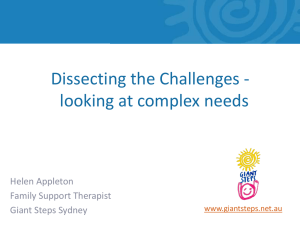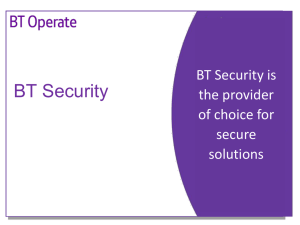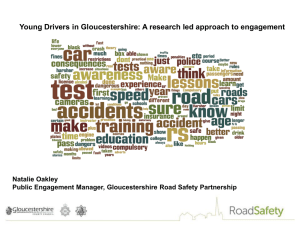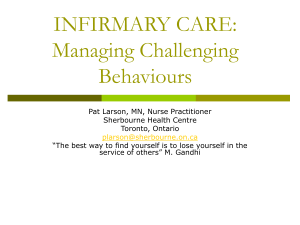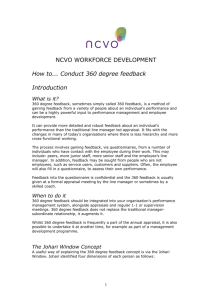BSBWOR501B
advertisement
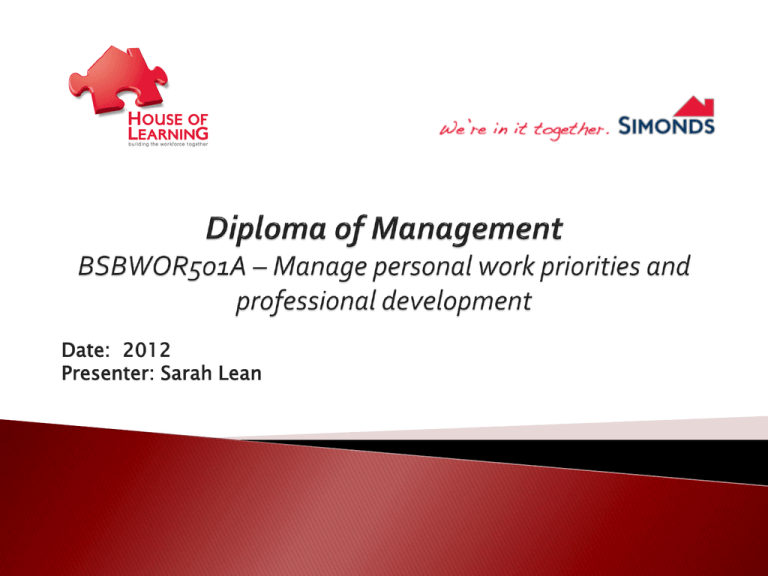
Date: 2012 Presenter: Sarah Lean At the end of this session you will be able to: Establish personal work goals Set and meet own work priorities Develop and maintain professional competence Serve as a positive role model in the workplace through personal work planning and organisation Role modelling can serve to reinforce the desired behaviour in the role model themselves, as well as encourage others to emulate them A role models actions, values and behaviours are upheld as the ideal Employees will only choose to look up to those who consistently display standards of work performance that they identify as: ◦ ◦ ◦ ◦ Desirable Superior to their own Being consistently applied Congruent with the organisation’s values and desired behaviours Personal qualities are largely determined by attitude; formed through our past experiences and learning Attitude is important to our work, our work situations and our ability to set and achieve goals The attitudes and behaviours of ourselves and the others with whom we interact affect our relationships Those whose attitudes and behaviours most closely reflect our own are usually the closest to us Difficulty often arises with those whose are dissimilar to us Understanding of our own attitudes and being willing to acknowledge and respect differences in others will work towards developing productive relationships Behavioural and attitude consistency are important to credibility In a management/leadership role credibility is important It contributes to modelling appropriate behaviours, leading by example and gaining and maintaining the trust and confidence of employees A demonstrated and consistently positive attitude towards work and employees in the workplace will be emulated by others in the workplace Characteristics of leaders and role models ◦ ◦ ◦ ◦ ◦ ◦ ◦ ◦ ◦ ◦ Uncompromising integrity High energy Good at working priorities Courageous A committed and dedicated hard worker Unorthodox and creative Goal orientation Inspired and contagious enthusiasm Staying level headed A desire to help others grow and succeed The behaviours of a good leader/manager will impact greatly on workplace efficiency and effectiveness Good leaders will model behaviours that encourage employees to endorse organisational goals and objectives Leaders/managers need to inspire employees to act ethically and with integrity You need to demonstrate what should be done and how it should be done to achieve organisational objectives You need to prepare people for change – as new ideas are suggested, improvements are made, innovations are proposed and as the organisation strives for sustainability over time A good manager/leader: ◦ Is able to make staff feel that they are valued ◦ Can aid staff in developing career pathways and in making active contributions to organisational success ◦ Will inspire and enthuse others ◦ Act as a positive role model ◦ Ensure staff derive job satisfaction ◦ Ensure the organisation benefits from the skills and knowledge of its diverse employees A role model is a person who serves as an example, whose behaviour is emulated by others Role models provide a reference for the behaviour and performance of others. Good leaders lead from the frontline – that is where the action is They are visible, known and approachable They give employees the responsibility, authority and resources to operate effectively They should be seen and be seen to be listening and observing Observing means: Building relationships with employees Noticing the things people do The problems they have to deal with Giving feedback Acknowledging the good work that people do Managers who are effective leaders will: Talk to their people/customers to make them aware they are actively listening Keep the lines of communication open and enable information sharing See and understand what employees do Work with staff/clients to find out what they really think of the organisation and ensure that product/service quality meets the staff/client’s value perceptions Take people and their concerns seriously Give credit and recognition when & where required Smart/secure managers/leaders: Hire competent, effective employees and let them do their job Delegate responsibility and authority to staff Involve people in decision making Treat everyone with respect Spread the power in the organisation so that they are, in effect, answerable to their staff Good leaders plan their work so the most important tasks are completed first They do not forget to carry out necessary tasks They are well organised and encourage members of their team to be well organised Management performance and behaviour will serve as a role model and encourage positivity in others if managers: Have a positive attitude Are enthusiastic and involved Accept responsibility Learn to understand others and to value diversity Provide appropriate feedback and reinforcement to staff Demonstrate competence with regards to job and management skills Provide opportunities for employees to develop their skills and knowledge Are honest, credible and act ethically Participate in suitable personal and professional development programs and activities Good leaders need to develop their own skills and knowledge including skills relating to: ◦ ◦ ◦ ◦ ◦ Communication Active listening Interpersonal interactions Cultural awareness Acceptance of and management of diversity As a manager, you usually have a greater degree of discretion in how to go about achieving the outcomes required of you than your staff Rather than being told how, when and where to perform a job, you are more likely to be given a broad direction of what is to be accomplished You are required to set your own goals and plan your activities to ensure your goals are realised This flexibility can be liberating It can encourage creativity However, it requires innovation, discipline and the ability to prioritise. Goal Setting The way in which you set goals strongly affects their effectiveness 1. 2. 3. 4. 5. Express your goals positively Be precise Set priorities Write goals down Keep operational goals small Many people spend their day in a frenzy of activity, but achieve little because they are not concentrating on the right things You can be extremely efficient, but achieve very little Efficiency is necessary so that tasks are completed within a timeframe. Ensure that the tasks you are completing are actually achieving or at least working towards the achievement of your goals Look for results Focus on the purpose of your activities Be effective Identify and remove time wasters from your schedule Do the right thing right Doing the right thing is more important than doing things right Doing the right thing is effectiveness Doing things right is efficiency Focus on effectiveness, and then concentrate on efficiency You are the source of your own time wastage Time wastage is not forced upon you Monitor the ways you use your time and make conscious changes to your behaviour Strategies for overcoming time wastage to maintain personal performance: Ensure that the goals you set are realistic When planning and prioritising, write the required activities onto a “to do list” in numbered order of importance Prioritise tasks/objectives in terms of usable results – purpose Include a time-based safety margin in your list Delegate effectively Take appropriate action Learn to say “no” Plan time for yourself Leave the office at lunch time Manage papers and paperwork Use effective filing processes and filing systems Consider your biological prime time Avoid being a perfectionist Arrange set times for jobs Fix definite times when you would like not to be disturbed Plan your telephone calls Hold and participate in effective meetings Interruptions and changes will always intrude A task list does not require absolute and rigid adherence Unexpected important tasks should be accepted as part of your work life and should not place undue stress on your prioritisation Measuring personal performance Measurement implies developing criteria against which your performance can be mapped and evaluated These criteria might relate to: Your job description Team goals Objectives you have set yourself Initiative Speed of work Commitment / attitude to work Development potential Reliability Contributions to teamwork Most of us feel that there will never be enough hours in the day to complete all of the tasks we have to do We all have competing demands that will impact on our ability to achieve personal, team and organisational goals Dealing with competing demands is a matter of prioritising tasks By prioritising tasks you ensure that the most important tasks get completed first and the less important tasks are completed later A “to do list” can help you determine what needs to be accomplished for the day It can make large tasks seem smaller and more manageable Know what is important and what is urgent Questions to ask when prioritising: ◦ ◦ ◦ ◦ ◦ ◦ What is the most important thing for me to do right now? What deadlines have I got? What happens if I do not do this? Is this important? Is this urgent? Do I have to do this? Busy managers are always on the go Being busy is not the same as being effective Be effective and be efficient How to prioritise: Start with a list of what you (or your team) need to do Group related tasks into projects, which represent your ultimate outcomes rather than just the actions you need to take At the start of the day, select the most important tasks that would make the most difference to productivity and goals Identify any other tasks that are important or have been neglected and need attention Schedule time in which you will work on the most important tasks on your list During the rest of the day, continue working on your listed tasks normally Determine what is important Good relationships with staff are important Effective managers make time for people because they know in the long run it will pay back many more times Work/Life Balance This does not mean an equal balance Trying to schedule an equal number of hours for each day of your various work and personal activities is usually unrewarding and unrealistic Your ideal individual work/life balance will vary over time, sometimes on a daily basic There is no perfect, one-size fits all It is balance you should be striving for The best work/life balance is different for all of us because we all have different priorities and different lives. At the core of an effective work/life balance are two everyday concepts: ◦ Achievement ◦ Enjoyment Enjoyment means pride, satisfaction, happiness, celebration, love, a sense of well being – all the joys of living A good working definition of work/life balance is: “meaningful achievement and enjoyment in each of the four life quadrants” Professional development: Is one of the cornerstones of our working lives It keeps us interested in our work Gives us the drive to progress our careers Keeps the industry competitive Makes us employable By taking ownership of your career, assessing your knowledge and skills and focussing on your professional development you will be: ◦ Able to identify the standards to which you should aspire ◦ Able to determine your own development needs, priorities and plans ◦ Better able to recognise opportunity ◦ Increasingly effective in the workplace ◦ Able to help, influence and lead others by example ◦ Confident of your future employability ◦ Have a fulfilling and rewarding career ◦ Able to demonstrate continuing commitment to your profession When considering your professional development plan consider: When and where you learnt best The types of activities that will be most effective for you The financial and time resource implications of your plan Learning styles Visual learning – involves the use of seen or observed things including pictures, diagrams etc. Auditory learning – involves the transfer of information through listening to the spoken word of self or others. They learn best through listening and speaking Kinaesthetic learning – involves physical experience – touching, holding, doing. They learn best through experiencing and doing things Left Brain Right Brain Is verbal Is visual Responds to word meanings Responds to tone of voice Is sequential – needs to follow a logical sequence Is random – assimilates from a variety of sources and sequences Processes information linearly Processes information in varied order Responds to logic Responds to emotion Plans ahead Is impulsive Recalls people’s names Recalls people’s faces Speaks with few gestures Gestures when speaking Is punctual Is less punctual Prefers formal study design Prefers sound/music background while studying Work involves goal setting, planning, taking action and monitoring. The more you know about yourself and others, the more likely it is that you will be able to achieve your goals Feedback from colleagues, staff and clients can assist you in identifying opportunities for growth and development. Effective forms of feedback from your workplace can include: Formal/informal performance appraisals Feedback from managers and colleagues Feedback from suppliers Personal reflection and self-assessment Be proactive in seeking feedback Standing still in today’s business world results in going backwards. We all must continually grow and develop if we are to remain current and competitive Creating and maintaining a competitive edge does not take luck but rather some solid strategic planning. You need to be continually scanning your business horizon, taking note of the changes and then ensuring that you develop new knowledge and skills in order to maintain your currency
